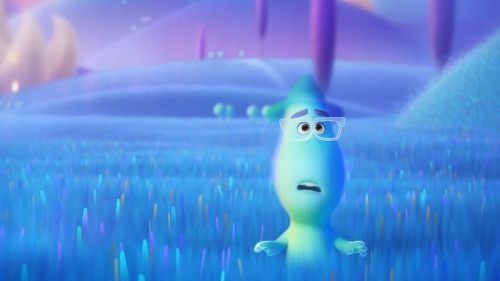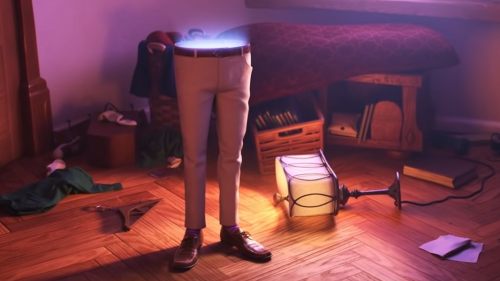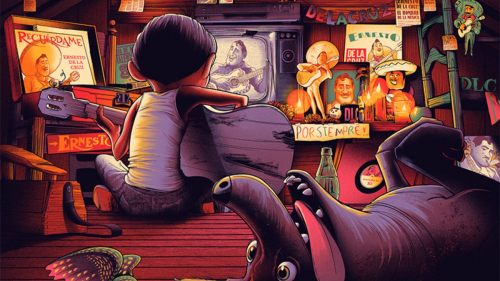ONWARD Review: Pixar’s Quest For…Goodness
The title of Onward feels just a tad ironic when seen at the beginning of Pixar’s latest animated fantasy, as it establishes a world in which progress has literally taken the magic out of life. In the past, wizardry was everywhere and touched all aspects of existence; then came inventions like the light bulb and other conveniences, and now the realm looks very much like our own. Spells and their practitioners are hard to come by, even as many mythical species still exist, and co-exist, in these more prosaic environments, which are full of little plays on popular brand names (Burger Shire, Mountain Doom, etc.). We’ve been to a land like this before, of course, in the Shrek movies, though this is not the same kind of deconstruction; Onward believes in fairy tales too much to want to fracture them.
Director/co-writer Dan Scanlon previously helmed Pixar’s Monsters University, and the m.o. here is similar: At its heart, amidst a landscape of the unreal, it’s about a couple of guys bonding. Our heroes are suburban elven brothers Barley and Ian Lightfoot (Chris Pratt and Tom Holland), the former of whom still believes in quests and heroism while the latter has trouble just getting along in high school. One cloud hovering over Ian is the fact that he never met his father, who passed away shortly before his birth, and whose absence is particularly keen as Ian prepares to greet, if not actually celebrate, his 16th birthday. But it turns out that Dad left Ian a present to open all these years later: a magical staff and a jewel called the Phoenix Gem with the ability to resurrect him, if only for just a single day.
The spell doesn’t entirely work, though, and Ian and Barley are greeted by an ambulatory pair of pants and shoes requiring a second ritual to fully restore their father. A second Phoenix Gem must be tracked down for this to happen, and finally, Barley can now embark on a quest similar to the ones he’s only experienced via role-playing card games, using knowledge gleaned from them to help his brother achieve his much-longed-for reunion. Onward thus becomes an all-ages road-trip movie, and a significantly more clever and engaging example than that other one starring a video-game character that’s in theaters right now. Yet it doesn’t quite clear the almost impossibly high bar Pixar has set for itself over the past (has it really been?) 25 years; ironically, given the subject matter, there isn’t the spark of magic that would elevate this consistently entertaining film to the level of animated art.
There’s still quite a bit of fun and meaning to be had on the journey, during which Barley would prefer to take the riskier yet potentially more rewarding roads while Ian prefers to play it safe. The dynamic between the two, as Barley attempts to get Ian to embrace his inner mage and adventurer, is what makes Onward more than the sum of its fantastical parts. Pratt and Holland have solid sibling chemistry, the former’s boisterousness and the latter’s thoughtfulness nicely complementing each other. If the theme behind their saga—the power of family—is a familiar one for this kind of movie, it’s expressed sincerely, with honest nuances and a generosity of spirit that earn the big emotional payoff at the end.
That generosity extends to Ian and Barley’s mom Laurel (given a spirited reading by Julia Louis-Dreyfus) also getting to go on the adventure and have her own hero moments. And while there’s an inevitable Big Action Climax to go with the uplift, it is one the movie has properly prepared us for, is genuinely exciting and incorporates a great visual joke. There are plenty of fun little details scattered throughout Onward, in fact, confirming the Pixar team’s continuing commitment to putting thought and care into every frame. It should go without saying by now that the visuals in general are lush, evocative and finessed to perfection.
Even given all that, Onward doesn’t leave you feeling as transported at the end as the studio’s best work; you’ve gone on a fun and ultimately moving journey, yet not a truly resonant one. Perhaps this can be chalked up to transition pains as Pixar moves into its post-John Lasseter phase; the real test may be its next film, Soul, which looks to venture into more unique and ambitious territory. Onward, for all its talk about confronting challenges and taking paths of peril, feels a little safe—if only by Pixar’s monumental standards.



